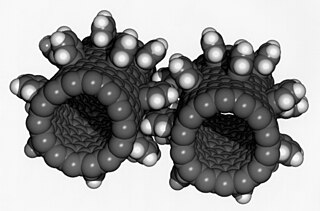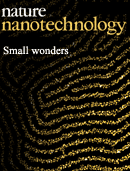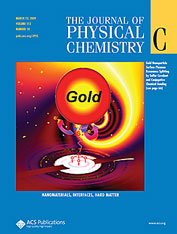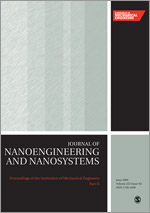
Nanotechnology, often shortened to nanotech, is the use of matter on atomic, molecular, and supramolecular scales for industrial purposes. The earliest, widespread description of nanotechnology referred to the particular technological goal of precisely manipulating atoms and molecules for fabrication of macroscale products, also now referred to as molecular nanotechnology. A more generalized description of nanotechnology was subsequently established by the National Nanotechnology Initiative, which defined nanotechnology as the manipulation of matter with at least one dimension sized from 1 to 100 nanometers (nm). This definition reflects the fact that quantum mechanical effects are important at this quantum-realm scale, and so the definition shifted from a particular technological goal to a research category inclusive of all types of research and technologies that deal with the special properties of matter which occur below the given size threshold. It is therefore common to see the plural form "nanotechnologies" as well as "nanoscale technologies" to refer to the broad range of research and applications whose common trait is size.

"There's Plenty of Room at the Bottom: An Invitation to Enter a New Field of Physics" was a lecture given by physicist Richard Feynman at the annual American Physical Society meeting at Caltech on December 29, 1959. Feynman considered the possibility of direct manipulation of individual atoms as a more robust form of synthetic chemistry than those used at the time. Although versions of the talk were reprinted in a few popular magazines, it went largely unnoticed. It did not inspire the conceptual beginnings of the field of nanotechnology. Beginning in the 1980s, nanotechnology advocates cited it to establish the scientific credibility of their work.
Nanosocialism refers generally to a set of economic theories of social organization advocating state or collective ownership and administration of the research, development and use of nanotechnology.
The Beilstein Institute for the Advancement of Chemical Sciences is a non-profit foundation located in Frankfurt am Main. Founded in 1951 by the Max Planck Society in honor of Friedrich Beilstein, today the institute supports chemistry and related fields with diamond open access journals, development of standards, funding and hosting scientific events and other projects to support the communication and distribution of scientific content.

The Journal of Physical Chemistry A is a scientific journal which reports research on the chemistry of molecules - including their dynamics, spectroscopy, kinetics, structure, bonding, and quantum chemistry. It is published weekly by the American Chemical Society.

Nature Nanotechnology is a monthly peer-reviewed scientific journal published by Nature Publishing Group. It was established in October 2006. The editor-in-chief is Fabio Pulizzi. It covers all aspects of nanoscience and nanotechnology.
The history of nanotechnology traces the development of the concepts and experimental work falling under the broad category of nanotechnology. Although nanotechnology is a relatively recent development in scientific research, the development of its central concepts happened over a longer period of time. The emergence of nanotechnology in the 1980s was caused by the convergence of experimental advances such as the invention of the scanning tunneling microscope in 1981 and the discovery of fullerenes in 1985, with the elucidation and popularization of a conceptual framework for the goals of nanotechnology beginning with the 1986 publication of the book Engines of Creation. The field was subject to growing public awareness and controversy in the early 2000s, with prominent debates about both its potential implications as well as the feasibility of the applications envisioned by advocates of molecular nanotechnology, and with governments moving to promote and fund research into nanotechnology. The early 2000s also saw the beginnings of commercial applications of nanotechnology, although these were limited to bulk applications of nanomaterials rather than the transformative applications envisioned by the field.
The impact of nanotechnology extends from its medical, ethical, mental, legal and environmental applications, to fields such as engineering, biology, chemistry, computing, materials science, and communications.
The Feynman Prize in Nanotechnology is an award given by the Foresight Institute for significant advances in nanotechnology. Two prizes are awarded annually, in the categories of experimental and theoretical work. There is also a separate challenge award for making a nanoscale robotic arm and 8-bit adder.

The Journal of Physical Chemistry C publishes scientific articles reporting research on several subdisciplines of physical chemistry:
Because of the ongoing controversy on the implications of nanotechnology, there is significant debate concerning whether nanotechnology or nanotechnology-based products merit special government regulation. This mainly relates to when to assess new substances prior to their release into the market, community and environment.

Small is a weekly peer-reviewed scientific journal covering nanotechnology. It was established in 2005 as a monthly journal, switched to biweekly in 2009, and to weekly in 2015. It is published by Wiley-VCH and the editor-in-chief is José Oliveira. According to the Journal Citation Reports, the journal has a 2021 impact factor of 15.153.

ACS Nano is a monthly, peer-reviewed, scientific journal, first published in August 2007 by the American Chemical Society. The current editor in chief is Xiaodong Chen. The journal publishes original research articles, reviews, perspectives, interviews with distinguished researchers, and views on the future of nanoscience and nanotechnology.
IOP Publishing is the publishing company of the Institute of Physics. It provides publications through which scientific research is distributed worldwide, including journals, community websites, magazines, conference proceedings and books. The Institute of Physics is a scientific charity devoted to increasing the practice, understanding and application of physics. Any financial surplus earned by IOP Publishing goes to support physics through the activities of the Institute.
The Journal of Nanoscience and Nanotechnology is published by American Scientific Publishers, a company identified as a predatory publisher on Beall's List. It was delisted from Web of Science in the 2019 index, after having received an expression of concern a year earlier.
Galina Vladimirovna Kurlyandskaya is a Russian physicist, known for her works on giant magnetoimpedance.

The Proceedings of the Institution of Mechanical Engineers, Part N: Journal of Nanoengineering and Nanosystems is a peer-reviewed scientific journal covering nanoscale engineering, nanoscience, and nanotechnology. It was established in 2004 and is published by SAGE Publications on behalf of the Institution of Mechanical Engineers.

Nanotechnology is a peer-reviewed scientific journal published by IOP Publishing. It covers research in all areas of nanotechnology. The editor-in-chief is Ray LaPierre.
Frontiers Media SA is a publisher of peer-reviewed, open access, scientific journals currently active in science, technology, and medicine. It was founded in 2007 by Kamila and Henry Markram. Frontiers is based in Lausanne, Switzerland, with other offices in London, Madrid, Seattle and Brussels. In 2022, Frontiers employed more than 1,400 people, across 14 countries. All Frontiers journals are published under a Creative Commons Attribution License.

Nanoscale is a peer-reviewed scientific journal covering experimental and theoretical research in all areas of nanotechnology and nanoscience. It is published by the Royal Society of Chemistry. According to the Journal Citation Reports, the journal has a 2021 impact factor of 8.307.









